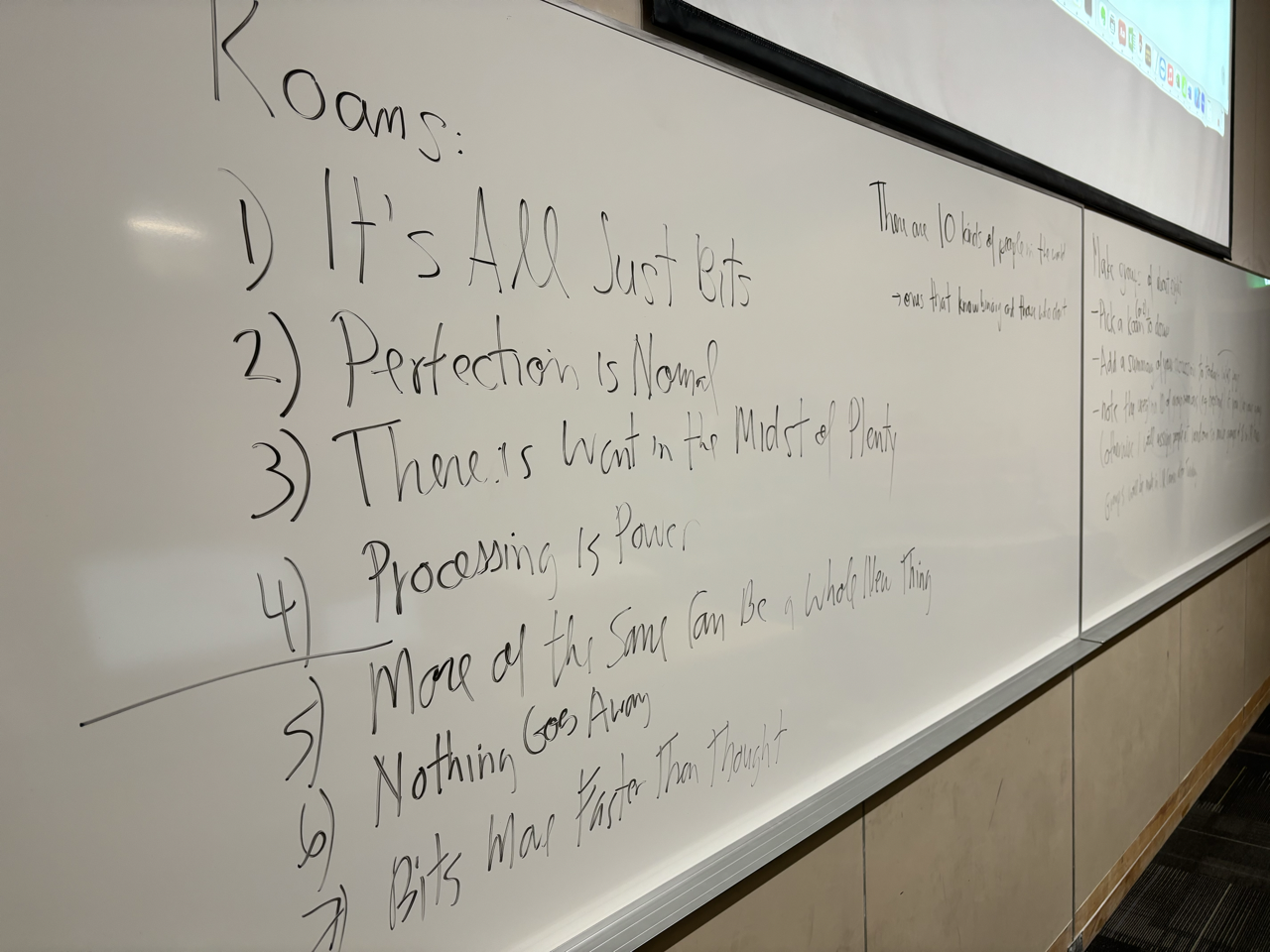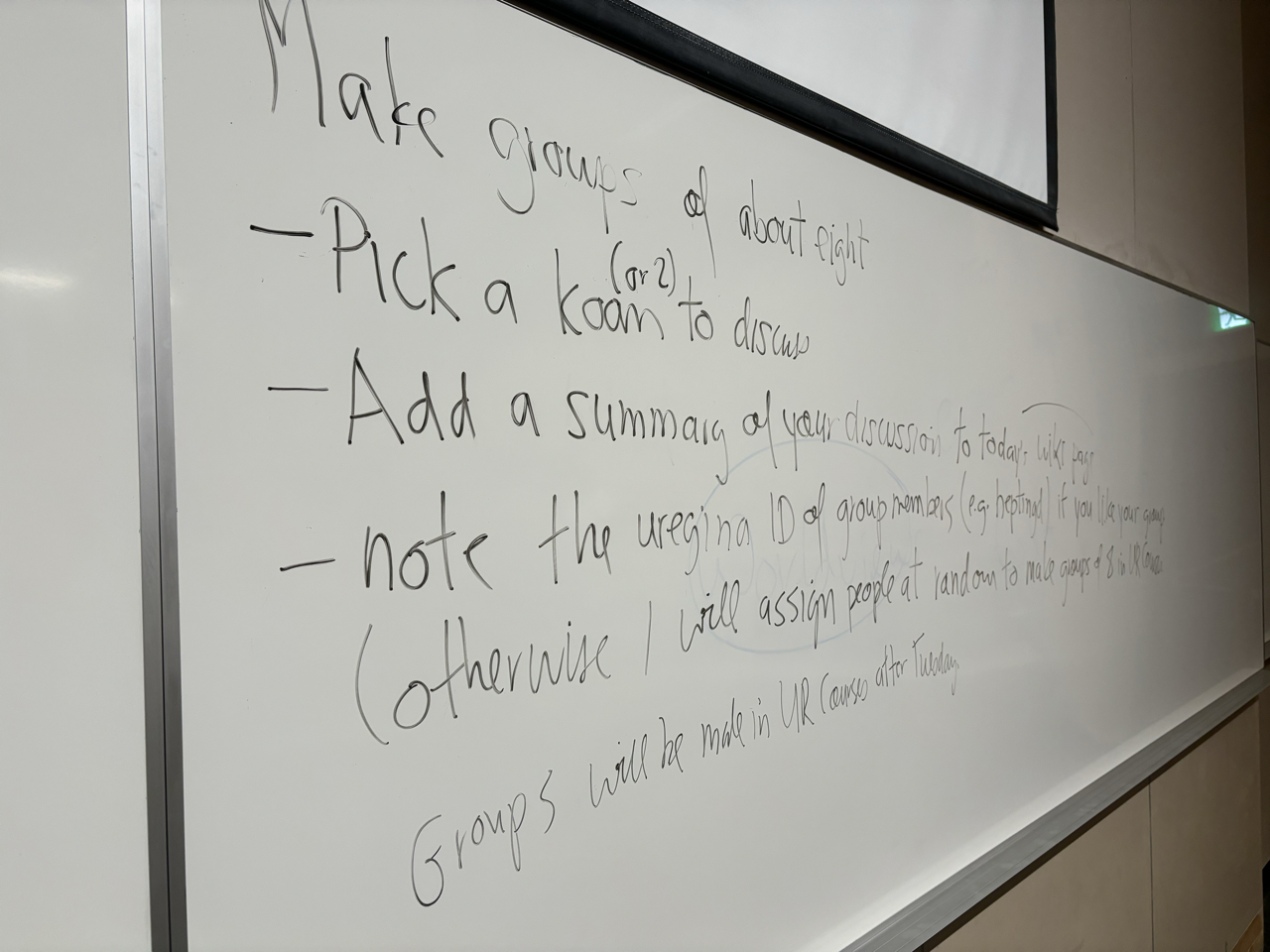Mtg 4/26: Thu-18-Jan-2024
Outline for Today
Social Context
Administration
- Happy Thursday
- Attendance
- Class calendar for today
- Upcoming events
Response to Responses
I did not intend to say that human intelligence was a risk, rather it is at-risk
Today
- reason for class cancellation on Tuesday
- assignment update
- Koans (from Blown to Bits) “seven truths about bits, called koans because they are paradoxes, like the Zen verbal puzzles that provoke meditation and enlightenment. These koans are oversimplifications and overgeneralizations. They describe a world that is developing but hasn’t yet fully emerged. But even today they are truer than we often realize. These themes will echo through our tales of the digital explosion.”:
- It’s All Just Bits
- Perfection Is Normal
- There Is Want in the Midst of Plenty
- Processing Is Power
- More of the Same Can Be a Whole New Thing
- Nothing Goes Away
- Bits Move Faster Than Thought
- Social Context CS2023: “Computers, the internet, and artificial intelligence, perhaps more than any other technologies, have transformed society over the past several decades, with dramatic increases in human productivity; an explosion of options for news, entertainment, and communication; and fundamental breakthroughs in almost every branch of science and engineering. It is also imperative to recognize that this is not a oneway street. Society also affects computing, resulting in a complex socio-technical context that is constantly changing, requiring the perspective of history to put the present, as well as possible futures, into appropriate perspective. Social Context provides the foundation for all other knowledge units in SEP (Society, Ethics and Professionalism), particularly Professional Ethics.”
- Topics:
- Social implications (e.g. political and cultural ideologies) in a hyper-networked world where the capabilities and impact of social media, artificial intelligence and computing in general are rapidly evolving
- Impact of computing applications (e.g. social media, artificial intelligence applications) on individual well-being, and safety of all kinds (e.g., physical, emotional,economic)
- Consequences of involving computing technologies, particularly artificial intelligence, biometric technologies and algorithmic decision-making systems, in civic life (e.g., facial recognition technology, biometric tags, resource distribution algorithms, policing software)
- How deficits in diversity and accessibility in computing affect society and what steps can be taken to improve diversity and accessibility in computing
- Growth and control of the internet, computing, and artificial intelligence
- Often referred to as the digital divide, differences in access to digital technology resources and its resulting ramifications for gender, class, ethnicity, geography, and/or underdeveloped countries
- Accessibility issues, including legal requirements and dark patterns
- Context-aware computing
- Illustrative Learning Outcomes:
- Describe different ways that computer technology (networks, mobile computing, cloud computing) mediates social interaction at the personal and social group level.
- Identify developers’ assumptions and values embedded in hardware and software design, especially as they pertain to usability for diverse populations including under-represented populations and the disabled.
- Interpret the social context of a given design and its implementation.
- Evaluate the efficacy of a given design and implementation using empirical data.
- Articulate the implications of social media use for different identities cultures, and communities.
- Explain the internet’s role in facilitating communication between citizens, governments, and each other.
- Analyze the effects of reliance on computing in the implementation of democracy (e.g., delivery of social services, electronic voting).
- Describe the impact of the under-representation of people from historically minoritized populations in the computing profession (e.g., industry culture, product diversity).
- Explain the implications of context awareness in ubiquitous computing systems.
- Explain how access to the internet and computing technologies affect different societies.
- Discuss why/how internet access can be viewed as a human right.
- Topics:
Summary
Summary
For Next Meeting
- Submit your response to this meeting before 11pm tonight
- Take quiz before the start of our next meeting
ACTION: Take quiz before next meeting
Wiki
Link to the UR Courses wiki page for this meeting


